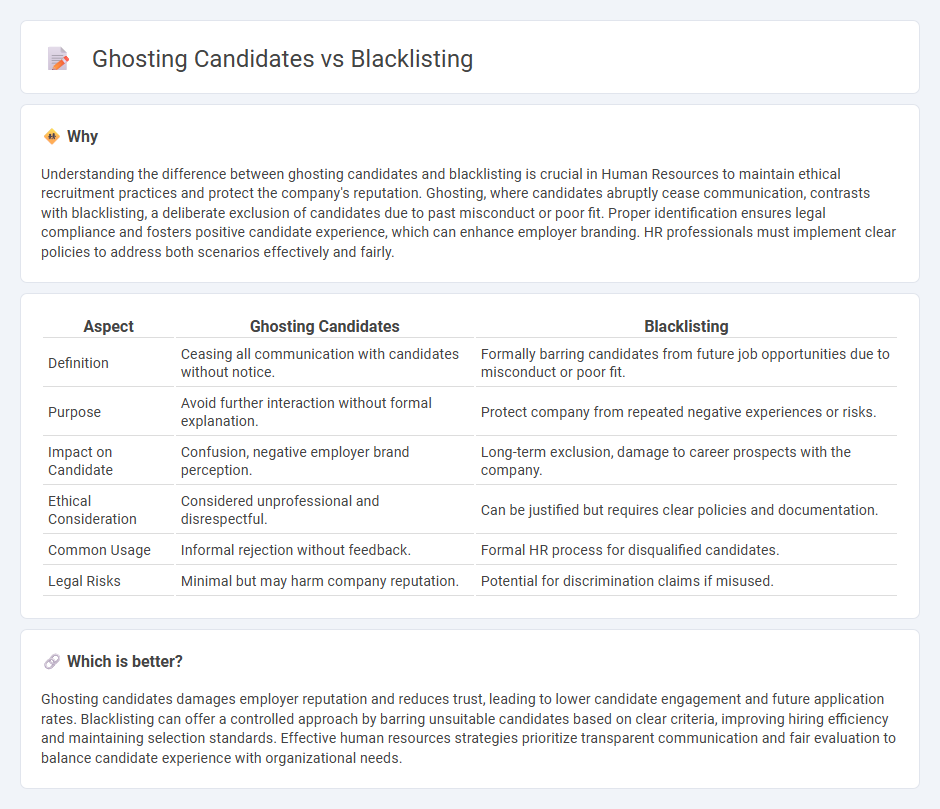
Ghosting candidates occurs when employers abruptly stop communication during recruitment, leaving applicants without closure and damaging the company's reputation. Blacklisting involves formally excluding candidates due to serious concerns like unethical behavior or poor performance, aiming to protect organizational integrity. Explore these critical HR practices to understand their impact on talent acquisition and retention.
Why it is important
Understanding the difference between ghosting candidates and blacklisting is crucial in Human Resources to maintain ethical recruitment practices and protect the company's reputation. Ghosting, where candidates abruptly cease communication, contrasts with blacklisting, a deliberate exclusion of candidates due to past misconduct or poor fit. Proper identification ensures legal compliance and fosters positive candidate experience, which can enhance employer branding. HR professionals must implement clear policies to address both scenarios effectively and fairly.
Comparison Table
| Aspect | Ghosting Candidates | Blacklisting |
|---|---|---|
| Definition | Ceasing all communication with candidates without notice. | Formally barring candidates from future job opportunities due to misconduct or poor fit. |
| Purpose | Avoid further interaction without formal explanation. | Protect company from repeated negative experiences or risks. |
| Impact on Candidate | Confusion, negative employer brand perception. | Long-term exclusion, damage to career prospects with the company. |
| Ethical Consideration | Considered unprofessional and disrespectful. | Can be justified but requires clear policies and documentation. |
| Common Usage | Informal rejection without feedback. | Formal HR process for disqualified candidates. |
| Legal Risks | Minimal but may harm company reputation. | Potential for discrimination claims if misused. |
Which is better?
Ghosting candidates damages employer reputation and reduces trust, leading to lower candidate engagement and future application rates. Blacklisting can offer a controlled approach by barring unsuitable candidates based on clear criteria, improving hiring efficiency and maintaining selection standards. Effective human resources strategies prioritize transparent communication and fair evaluation to balance candidate experience with organizational needs.
Connection
Ghosting candidates during the recruitment process damages a company's reputation and trust, often leading to informal blacklisting within professional networks. Candidates who experience ghosting are likely to share their negative experiences, causing employers to be avoided or reported in industry circles. This cycle deteriorates talent acquisition efforts and extends the impact of blacklisting beyond formal HR actions.
Key Terms
Candidate Experience
Blacklisting candidates involves permanently barring them from future opportunities based on past interactions or behaviors, often leading to a negative reputation for the employer. Ghosting candidates, the practice of abruptly ending communication without explanation, significantly damages the candidate experience by leaving applicants uncertain and undervalued. Explore effective strategies to enhance candidate engagement and maintain a positive hiring reputation.
Communication
Blacklisting candidates involves permanently barring them from future job opportunities due to serious issues like unethical behavior or poor performance, often documented and shared among recruiters. Ghosting occurs when either the employer or candidate abruptly stops all communication without explanation, causing uncertainty and frustration during the hiring process. Explore more to understand how clear communication strategies can improve candidate experience and recruitment outcomes.
Professional Reputation
Blacklisting candidates involves formally barring individuals from future job opportunities due to unethical behavior or poor performance, significantly impacting their professional reputation within an industry. Ghosting candidates, where communication is abruptly cut off without explanation, damages trust and can negatively affect a company's reputation among job seekers. Explore deeper insights on managing candidate interactions to uphold professional standards and reputational integrity.
Source and External Links
Blacklisting * Definition * Whistleblower Encyclopedia - Blacklisting is the practice of creating a list of individuals or entities denied privileges or opportunities, often due to perceived misconduct or untrustworthiness, and is illegal when used to silence whistleblowers in employment contexts.
Blacklisting - Wikipedia - Blacklisting is the action of compiling a list of people or entities to be avoided or distrusted, historically dating back to the 1600s and often associated with banning or punishing those deemed unacceptable by the list makers.
Blacklisting in the Workplace: What HR Managers Need to Know - In the workplace, blacklisting typically refers to excluding individuals from employment opportunities due to poor performance, behavioral problems, or unreliability such as absenteeism or tardiness.
 dowidth.com
dowidth.com